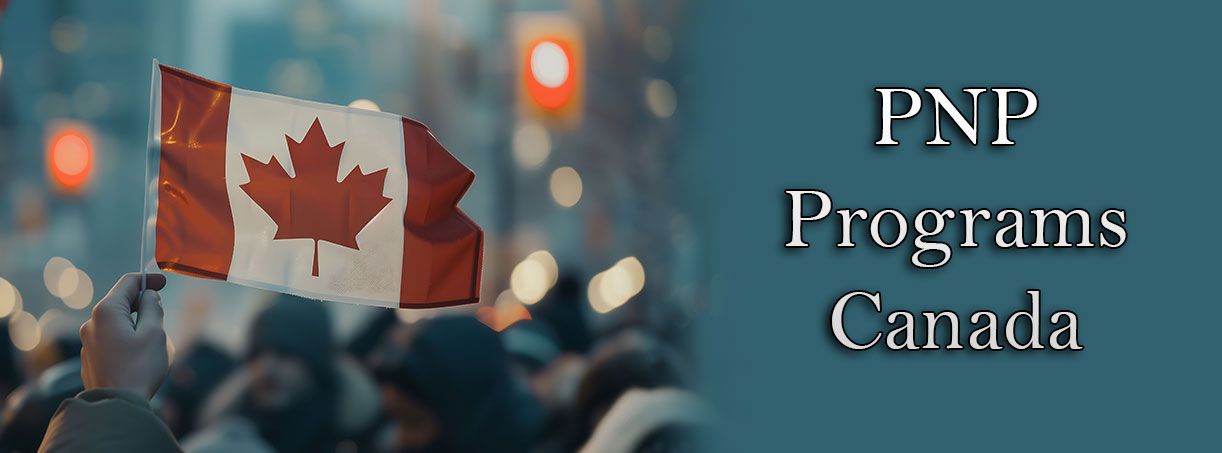Canada Provincial Nominee Program
Canada is globally recognized as one of the most immigrant-friendly nations. With over 400,000 new immigrants welcomed annually, the country offers multiple immigration Gala Paths, among which the Provincial Nominee Program (PNP) stands out as a vital option. The PNP allows provinces and territories to nominate individuals who wish to immigrate to Canada and settle in a specific province.
This article provides an in-depth look at the PNP, its structure, eligibility requirements, provincial streams, application steps, benefits, and frequently asked questions. It also includes key immigration terms such as Express Entry, CRS score, NOC codes, and CLB levels to help you navigate the process with confidence.
To receive professional immigration consultation, please fill out the form below:
What is the Provincial Nominee Program (PNP)?
The Provincial Nominee Program (PNP) is an immigration Gala Path that enables Canadian provinces and territories to nominate individuals for permanent residency (PR) based on their skills, work experience, and ability to contribute to the local economy.
PNP Streams: Two Main Categories
- Base Streams – Managed entirely by the province. Candidates apply directly to the province and, if nominated, later apply to IRCC for PR.
- Enhanced Streams – Linked to Express Entry. Candidates are nominated through Express Entry, which significantly increases their Comprehensive Ranking System (CRS) score by 600 points.

Why Choose PNP Over Other Immigration Routes?
- Targeted for in-demand occupations.
- Offers a Gala Path for those with lower CRS scores.
- Faster processing under Express Entry-aligned streams.
- Greater flexibility for candidates with job offers from rural or smaller regions.
- Direct Gala Paths to permanent residence without needing employer sponsorship in some provinces.
Provincial Nominee Programs by Province
Each province has its own PNP streams tailored to its labor market and economic needs. Below is a breakdown of the major PNPs:
1. Ontario Immigrant Nominee Program (OINP)
- Streams: Human Capital Priorities, Employer Job Offer, Masters Graduate, PhD Graduate
- In-demand Occupations: Tech, healthcare, trades
- Express Entry: Yes
2. British Columbia Provincial Nominee Program (BC PNP)
- Streams: Skills Immigration, Express Entry BC, Entrepreneur Immigration
- Tech Pilot: Ongoing invitations for 29 tech occupations
- Language Requirements: Minimum CLB 4–7
3. Alberta Advantage Immigration Program (AAIP)
- Streams: Alberta Opportunity Stream, Express Entry Stream, Rural Renewal Stream
- Advantage: Lower CRS thresholds (e.g., 300)
- Popular With: IT professionals, truck drivers, nurses
4. Saskatchewan Immigrant Nominee Program (SINP)
- Streams: International Skilled Worker, Entrepreneur, Farm Owner
- Eligibility: Based on Expression of Interest (EOI)
- NOC-specific draws: IT, trades, healthcare
5. Manitoba Provincial Nominee Program (MPNP)
- Streams: Skilled Workers in Manitoba, Skilled Workers Overseas, International Education Stream
- Support Required: Job offer or family connection in Manitoba
6. Nova Scotia Nominee Program (NSNP)
- Streams: Nova Scotia Demand, Nova Scotia Experience, Labour Market Priorities
- Targeted Occupations: Nurses, early childhood educators, developers
7. New Brunswick Provincial Nominee Program (NBPNP)
- Focus: Francophone and bilingual candidates
- Events: Often recruits through international job fairs
8. Prince Edward Island (PEI) PNP
- Draws: Monthly based on labor demand
- Categories: Express Entry, Labour Impact, Business Impact
9. Newfoundland and Labrador Provincial Nominee Program (NLPNP)
- Streams: Skilled Worker, Express Entry Skilled Worker, International Graduate
- Tech Sector Focus: Growing priority area
10. Territories: Yukon, Northwest Territories, Nunavut
- Small but targeted PNPs
- Strong demand for skilled trades, healthcare, and general labor roles
How Does the PNP Application Process Work?
The application process depends on whether you apply through a base stream (directly to the province) or an enhanced stream (linked to Express Entry).
Base PNP Application Process (Non-Express Entry)
- Choose a province that aligns with your profile.
- Apply to the province via its PNP portal.
- If nominated, receive a Provincial Nomination Certificate.
- Apply for permanent residence to IRCC using your nomination.
- Undergo medical and police background checks.
- Wait for PR decision (processing times vary by stream).
Enhanced PNP Application Process (Express Entry-linked)
- Create an Express Entry profile.
- Indicate interest in provinces/territories.
- Get a Notification of Interest (NOI) if selected by a province.
- Submit a full application to that province’s PNP program.
- If nominated, receive 600 CRS points automatically.
- Wait for an Invitation to Apply (ITA) for PR from IRCC.
- Submit your final application and documents.
- Await PR approval.
General Eligibility Criteria for PNPs
While each province has unique criteria, common eligibility requirements include:
- Age: Usually 21–59
- Education: Post-secondary diploma or higher
- Language Proficiency: IELTS/TEF – often CLB 4 to 7 (depending on stream)
- Work Experience: 1–2 years of experience in NOC 0, A, B (or sometimes C)
- Job Offer: Required in many base streams; not mandatory in Express Entry-linked ones
- Intent to Settle: Must demonstrate willingness to live in the nominating province
- Proof of Funds: Similar to Express Entry, showing ability to support yourself and family
- Adaptability Factors: Education/work/study in Canada, relatives in province, etc.

Key Documents Required
Here’s a typical checklist of documents required for PNP and PR applications:
- Passport and travel documents
- Educational Credential Assessment (ECA)
- IELTS or TEF test results (valid within 2 years)
- Proof of work experience (reference letters, pay slips)
- Police clearance certificates
- Proof of funds (bank statements)
- Job offer (if applicable)
- Provincial nomination certificate
- Express Entry profile number (for enhanced streams)
Language Requirements (IELTS, TEF, CLB)
Language testing is essential for all PNP streams. Canadian immigration uses CLB (Canadian Language Benchmark) scores. Here’s a quick conversion chart:
| CLB Level | IELTS General – Listening | Reading | Writing | Speaking |
|---|---|---|---|---|
| CLB 4 | 4.5 | 3.5 | 4.0 | 4.0 |
| CLB 5 | 5.0 | 4.0 | 5.0 | 5.0 |
| CLB 7 | 6.0 | 6.0 | 6.0 | 6.0 |
| CLB 9 | 8.0 | 7.0 | 7.0 | 7.0 |
Processing Times and Costs
👉 Processing Times
Provincial Nomination: 2 to 9 months depending on province and stream
👉 Permanent Residence (via IRCC):
- Express Entry-linked: 6–8 months
- Base PNP: 15–20 months
Costs
| Expense | Estimated Cost (CAD) |
|---|---|
| Language Test (IELTS/TEF) | $300 – $350 |
| Educational Credential Assessment | $200 – $300 |
| Provincial Application Fee | $250 – $1,500 (varies) |
| PR Application (IRCC) | $1,365 (adults) |
| Police/Medical Exams | $150 – $400 |
Benefits of PNP Immigration Gala Path
- Alternative to high CRS barrier in Express Entry
- Nomination adds 600 CRS points
- Suitable for skilled, semi-skilled, and low-skilled workers
- Accessible for international graduates and temporary foreign workers
- Gala Path for those with provincial job offers
- Provides opportunity for settlement in smaller or rural communities
Conclusion: Is PNP Right for You?
If your CRS score is not high enough for direct Express Entry selection, or you wish to settle in a specific province, the Provincial Nominee Program (PNP) can be a powerful and accessible Gala Path to permanent residence in Canada. Whether you are a skilled worker, recent graduate, entrepreneur, or semi-skilled laborer, there is likely a PNP stream tailored to your profile.
Taking time to research and match your background to the right provincial stream, preparing your documentation carefully, and understanding the application steps can greatly improve your success rate. Working with a certified immigration consultant may also help navigate this complex process with greater confidence.
To receive professional immigration consultation, please fill out the form below:
Frequently Asked Questions (FAQ)
1- Can I apply to multiple provinces at the same time?
No, you should only apply to one province at a time. Submitting multiple applications can create conflict and lead to rejection.
2- Do I need a job offer for PNP?
Not always. Some streams (especially Express Entry-linked) do not require a job offer. However, many base streams are employer-driven.
3- Can I switch provinces after getting PR through PNP?
While Canadian law allows freedom of movement, you are expected to settle and live in the province that nominated you. Switching immediately may raise serious immigration concerns.
4- What if I don’t meet the CRS cut-off in Express Entry?
PNP is a strong alternative. A provincial nomination gives you 600 additional CRS points, practically guaranteeing an ITA.
5- How long is a provincial nomination valid?
Usually for 6 months. You must apply for permanent residence within this timeframe.
6- Can international students apply for PNP?
Yes. Many provinces have specific streams for international graduates from Canadian institutions (e.g., Ontario’s Masters Graduate Stream, BC’s International Graduate Stream).
7- Is French language proficiency beneficial?
Absolutely. Provinces like Quebec, New Brunswick, and Ontario prioritize Francophone candidates.

